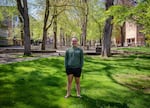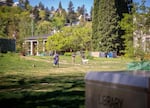Life has changed rapidly for Motu Sipelii in the past few months.
Sipelii, 22, is a first-generation college student who transferred to Portland State University from American Samoa Community College.
He has a lot on his plate as a resident academic mentor and the student life director at PSU, and the ongoing coronavirus pandemic has not made things any easier.

Motu Sipelii, a student and resident academic mentor for University Housing and Resident Life at Portland State University, poses for a portrait in the South Park Blocks on the university's downtown Portland, Ore., campus on Friday, April 17, 2020.
Bryan M. Vance / OPB
“There are just so many things that residents need that I can’t really help them with,” Sipelii said. “A lot of them aren’t doing so well because of the whole pandemic thing.”
In his roles, Sipelii acts as a peer mentor to students — offering information about academic resources and accommodations, and he offers a listening ear for concerns and questions.
A lot of the residents Sipelii was mentoring ended up leaving school over spring break, when Oregon Gov. Kate Brown enacted her stay-at-home order on March 23 and businesses began closing.
The school’s on-campus resident population decreased from about 1,800 to about 675, PSU said.
Related: As COVID-19 Clears Campuses, Oregon Universities Prepare For Budget Crisis
Unlike some of the other colleges and universities in Oregon, PSU has a large population of older, nontraditional students, many of whom have full-time jobs on top of going to school.
“A lot of them lost their jobs,” Sipelii said of his residents. “They weren’t able to afford to live on campus and they had to move back home. If it wasn’t that, then a lot of them weren’t able to get certain scholarships and internships … and a lot of the international students had to go back home because their country’s borders were closing.”
Regardless of PSU’s unique demographics, other campuses around Oregon are seeing similar departures.
At the University of Oregon in Eugene, there are currently about 200 students living in residence halls versus more than 4,800 at the end of the fall term.
Even at smaller schools, like Eastern Oregon University in La Grande, the on-campus student population reduced to 80 students, down from 369 in the fall.
For the students who have stayed, the way campus looks and feels has changed immeasurably.
For Betsy Rochelle at Eastern Oregon University, those changes also happened quickly.
Rochelle, 19, lives on-campus as a resident assistant, or RA.
She said when the switch to online classes was announced, other RAs began to quit.
“We went from 14 RAs to eight,” Rochelle said. As far as the students she oversees, “I went from 40 students to 10 in my hall,” she said.
Each of Rochelle’s three roommates moved out over spring break, leaving her by herself, something she was anxious about, she said, so she got her family dog, Harley, certified as an emotional support animal to keep her company while she’s on her own.

Betsy Rochelle, a student at Eastern Oregon University, poses for a portrait while her dog Harley looks on from her dorm room over a Zoom video call on Friday, April 17, 2020. Eastern Oregon University moved all spring term classes to remote access to slow the potential spread of the new coronavirus.
Bryan M. Vance / OPB
“She’s definitely helped a lot,” Rochelle said, but she said she’s seeing other students grapple with the isolation.
“I’ve got a couple of residents who are struggling a lot,” Rochelle said. “And I’m trying to help as much as possible, but it’s one of those things that’s hard to help with.”
Rochelle said she’s trying to work on organizing events like a social distancing picnic or a video pet pageant, but she said it’s difficult to replace in-person interaction for her residents or herself.
“I don’t work other than being an RA,” Rochelle said. “So going to class, that's what I did. It was my social interaction.”
For some students living on-campus, dining halls are offering to-go food options to keep students fed and to keep intact some sense of normalcy.
Spence Garfield, a junior at Portland State University, doesn’t have that option.

Spence Garfield, a student at Portland State University, poses for a portrait on an empty South Park Blocks in downtown Portland, Ore., on Tuesday, April 21, 2020. Colleges across Oregon have shifted to online-only courses in the face of the coronavirus pandemic.
Bryan M. Vance / OPB
Garfield lives in University Pointe, a building that’s not technically a residence hall but is still located on PSU’s campus, so she doesn’t have a dining hall in her building.
Instead, she shops for groceries and cooks for herself. Other than that, she rarely leaves her apartment out of fear of spreading the coronavirus.
“Knowing that I could go out and like, infect some poor, old grandma — that makes me really upset. It makes me scared,” Garfield said. “So, I’ve been staying inside a lot.”
As the sun begins to come out more, Garfield said, it’s jarring to see PSU’s campus so empty.
“The Park Blocks are so popular during springtime, like everyone is laid out in the grass and it’s usually hard to find a spot,” Garfield said. “Now it’s like, there’s maybe five people walking down the whole Park Blocks, and it’s really eerie. I saw more people walking around when I was taking classes over the summer.”

The South Park Blocks on Portland State University's downtown campus sit mostly empty on a normally busy morning on Friday, April 17, 2020. Oregon college campuses have been unusually quiet amid the coronavirus pandemic as schools have shifted to remote learning.
Bryan M. Vance / OPB
In Eugene, at the University of Oregon, Ramon Hernandez is seeing the same thing.
“The thing I miss the most about campus is just how vibrant it is during the springtime. Everyone’s out. The sun’s coming out. People are on the lawn just hanging out,” he said.
It’s Hernandez’s second year at UO, so he’s only experienced spring on campus once before.
Related: Oregon Colleges Cancel All Spring Semester In-Person Classes, In-Person Commencement
“Last year, it was my favorite part of the year, and it’s really sad that the freshmen this year aren’t able to have that experience,” Hernandez said. “I guess I just miss campus being active. It’s kind of sad just seeing it all dead.”
Hernandez also works as a resident assistant at UO.
Like on other campuses, Hernandez said the majority of the residents he works with have left as well as some of his fellow staff members.
“Now I have about two [residents] who are actually living on my floor,” Hernandez said.
He’s from Albany, less than an hour away from Eugene, but decided to stay in his role as an RA on campus to continue helping students and maintain access to dining halls and study rooms.

Ramon Hernandez, a student at the University of Oregon, poses for a portrait from his dorm room in Eugene, Ore., on a Zoom video call on Thursday, April 16, 2020. The University of Oregon, like all public universities in the state, has moved to remote learning amid the coronavirus pandemic.
Bryan M. Vance / OPB
“It’s sad that a lot of this is happening, but I try to remind myself it could be a lot worse,” Hernandez said.
“I’m still getting an education, and I’m not in such a financial restraint as other students might be because they have rent to pay,” he said. “I’m really glad that this is my job. This is how I pay for rent is by being here.”
He continued: “It’s totally understandable if people need to go back home … but we’re here to support anybody who needs to come back.”
Although he’s trying to continue his life as normally as he can, the pandemic has created uncertainties for Hernandez.
He is planning to study abroad in Germany next year and hopes that can still happen.
Rochelle at EOU is a theatre minor and was a stage manager, but all of the school’s productions have been canceled.
Garfield was a sports reporter for the Portland State Vanguard, the school’s student newspaper.
Sipelii, who came to PSU from American Samoa, is the Luau Coordinator for the school’s Pacific Islanders club.
“When [the luau] got canceled, that was like nine months of work down the drain,” Sipelii said.
He said many of the club members ended up moving back home.

Owners practice social distancing and dogs get up close and personal with each other while playing at the Oak Savanna on Portland State University's downtown Portland, Ore., campus on Friday, April 17, 2020. The campus of one of Oregon's largest universities turned into a ghost town following Oregon. Gov. Kate Brown's stay-at-home order on Monday, March 23, 2020.
Bryan M. Vance / OPB
“It was sad to see them leave because like, a lot of them were still new here, and they were still trying to find their community here, which they found in the club,” he said. “A lot of them said, ‘No, I can’t come back to PSU’ because they can’t afford it because they were first-generation too.”
Sipelii said he had the option to graduate this year, but he’s going to wait until next year to make sure his mom and grandma in American Samoa can attend.
